Awakening the Quieter Virtues by Spencer Gregory;

Author:Spencer, Gregory; [Spencer, Gregory]
Language: eng
Format: epub
Publisher: InterVarsity Press
Published: 2010-07-07T00:00:00+00:00
The Discipline of Timely Remembrance
In The Giver, Lois Lowry tells the story of how a society becomes bland and controlled when everyone except one person is disconnected from the past. After the main character, Jonas, is chosen as the communityâs next memory holder, or Receiver, he learns that remembering is important because thatâs âhow wisdom comes. And how we shape our future.â
For those interested in fostering modesty, âtimely remembranceâ is the key discipline. Wisdom comes from spiritual self-examination, especially when we reflect on excessive pride. Too many of us practice intentional amnesia, forgetting our immodesties as soon as possible so that we can âmove on.â On the other hand, some never forget, punishing themselves relentlessly. Instead of choosing amnesia, we need to practice a godly anamnesis, the act of resisting forgetfulness. In The Living Reminder, Henri Nouwen says, âForgetting the past is like turning our most intimate teacher against us. . . . Only those who face their wounded condition can be available for healing and so enter into a new way of living.â
Timely remembrance has a lot to offer, and I think its richness is found in Jesusâ Last Supper: âAnd he took bread, gave thanks and broke it, and gave it to them, saying, âThis is my body given for you; do this in remembrance of meââ (Luke 22:19). Using Jesusâ words and Henri Nouwenâs commentary for inspiration, I would like to offer a meditation on the importance of remembering for the sake of modesty. Here are the basics: Jesus took the bread, gave thanks, broke it and gave it to his disciples.
Taking the timely remembrance: Recollect in truth. Jesus took the bread and said, âThis is my body.â Although the disciples did not want to hear it, Jesus told them the hard truth that he was going to die. Likewise, in timely remembrance, we take the time to recount the truth about an experience. As best we can, we are not to make ourselves look better than we wereâor worse. Our tendency to change our memories over time, usually in a way that justifies our actions, is one of the reasons our remembrance needs to be timely, before we lose the knowledge that might lead to greater modesty. Even when we have been wrongedâespecially when we have been wrongedâwe should strive to remember well, asking others for their impressions, knowing that along the way, we may learn about our own mistakes and need to suffer modesty. âTaking the timely remembranceâ is not a nostalgic move, a sweet sentimentalizing of the past. It is a humble and brave recollection.
Giving thanks for the timely remembrance: Recollect in prayer. Without gratitude for what God might teach us, we might not proceed at all. Without a sense that God is there to catch us, we might not risk the leap into timely remembrance. So, as Jesus did, we pray gratefully. We ask that our self-examination would teach us who we are before God, would lead us to an accurate self-image. As St.
Download
This site does not store any files on its server. We only index and link to content provided by other sites. Please contact the content providers to delete copyright contents if any and email us, we'll remove relevant links or contents immediately.
The 5 Love Languages: The Secret to Love That Lasts by Gary Chapman(9288)
The Space Between by Michelle L. Teichman(6576)
Assassin’s Fate by Robin Hobb(5856)
Wiseguy by Nicholas Pileggi(5320)
Everything Happens for a Reason by Kate Bowler(4479)
Gerald's Game by Stephen King(4377)
Pillow Thoughts by Courtney Peppernell(4018)
A Simplified Life by Emily Ley(3971)
The Power of Positive Thinking by Norman Vincent Peale(3864)
Resisting Happiness by Matthew Kelly(3197)
Girl, Wash Your Face by Rachel Hollis(3126)
Harry Potter and the Prisoner of Azkaban (Book 3) by J. K. Rowling(3113)
Being Aware of Being Aware by Rupert Spira(3086)
Real Sex by Lauren F. Winner(2867)
The Code Book by Simon Singh(2859)
More Language of Letting Go: 366 New Daily Meditations by Melody Beattie(2850)
Name Book, The: Over 10,000 Names--Their Meanings, Origins, and Spiritual Significance by Astoria Dorothy(2840)
The Holy Spirit by Billy Graham(2777)
The Secret Power of Speaking God's Word by Joyce Meyer(2754)
